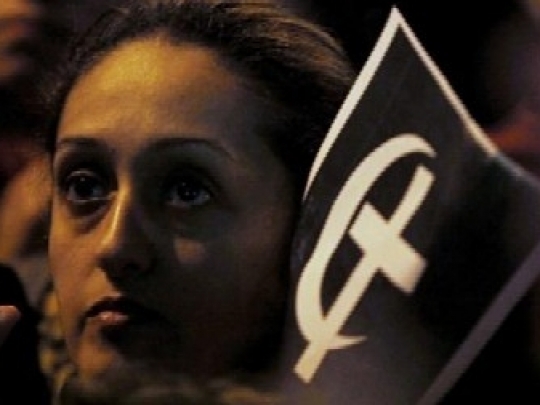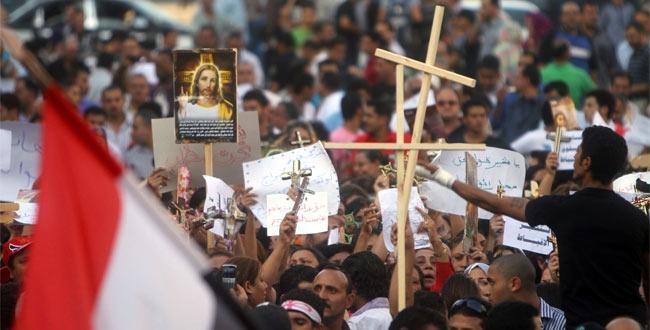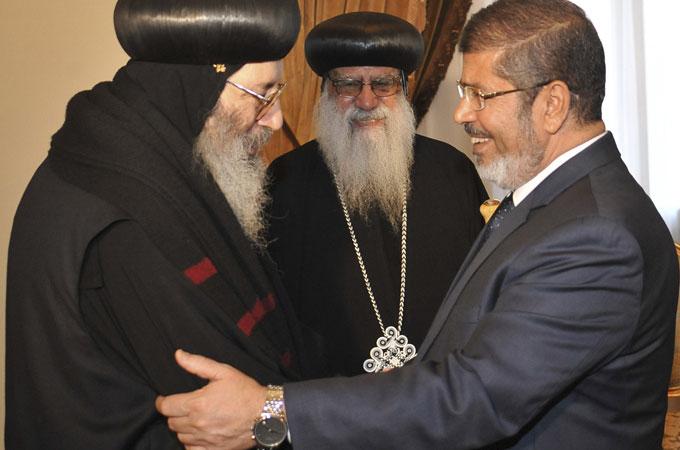It is normal that Copts worry about the future of the civil state in Egypt, but they have to be careful as this topic has become a political tool both regionally and internationally
Hamze Abbas Jammoul
The Term "Copts" is derived from the Greek to designate the Egyptians in the Roman Egypt. During the Muslim government of Egypt, the word "Copts" became restricted to those Egyptians adhering to the Christian religion to designate them from the Islam population (Abu Seif 1987:15).

Christians in Egypt are a minority and 90% of them belong to the Coptic Orthodox church (Abaza, 2005). The Copts in Egypt are the biggest Christian community in the Arab World, they are about 10-20 percent of seventy seven millions Egyptians (Ibid).
Copts in Egypt are not guests and they have participated in all fields in the Egyptian life as well as contributed in the developing of the political, social, economic and cultural life in the country. Egypt has had two Christians prime ministers, several ministers of foreign affairs, and others in key positions of the Egyptian state (Ibid). After 1952, however, the Copt’s participation in political life was reduced, and few signs of discrimination showed in Egypt. This discrimination, however, increased greatly during Mubarak’s era. On 2010, because of a love story between a Christian man and Muslim women, 3 persons were killed. Egypt faced a sectarian conflict when this case transformed to a sectarian accident. This example of sectarian violence was repeated again on 2010 and even after the resignation of Mubarak in 2011. Political discrimination, church burning and sectarian clashes have been common in Egypt in the last years. All these examples confirm that in Egypt something wrong was happening. Was it an organized plan against the minorities' communities? What is the role of the Government in this plan? What is the status – quo of the Copts after the revolution especially after the victory of Muslims in the first post revolution election?
These questions will help us to highlight on the Copts issue in Egypt and to analyze it discussing the role of the new authority after the success of the 25 January revolution.
After Mubarak resignation from his office, the Supreme Council for the Armed Forces (SCAF) became the new authority in Egypt. The Council dissolved Egypt’s parliament and suspended the Constitution in response to demands by demonstrators. The council declared that it would hold power for six months, or until elections could be held. One may ask, had the policy in Egypt changed toward Copts in this transitional period?
 Since the first day after the resignation of Mubarak, the SCAF was confused and did not have a plan to apply. Al Jazeera Studies Center, affirmed in an article titled, “ Maspero case and the transitional period in Egypt” , affirmed that the Supreme Council for the Armed Forces managed the country without any plan following the Mubarak way of government. According to this article this way of government has created a gap in the relationship between Egyptians and the Authority. This gap increased when the Council of the Armed Forces did not react as a partner but as a governor (2011).
Since the first day after the resignation of Mubarak, the SCAF was confused and did not have a plan to apply. Al Jazeera Studies Center, affirmed in an article titled, “ Maspero case and the transitional period in Egypt” , affirmed that the Supreme Council for the Armed Forces managed the country without any plan following the Mubarak way of government. According to this article this way of government has created a gap in the relationship between Egyptians and the Authority. This gap increased when the Council of the Armed Forces did not react as a partner but as a governor (2011).
As a result of the council policy, new manifestations and sectarian violence were the protagonist in the squares of Egypt. On 9 October 2011 Liberal Muslims and Copts Christians moved together to Cairo’s Mapsero area to protest the burning of a Coptic church. During the protest a group of radical Muslims attacked the protestors then the Egyptians security forces intervened and fired live ammunition indiscriminately. The result of this clash was terrible: 24 people were killed and more than 300 were wounded (Aciman, 2011).
Beyond the political position what we seek is to give a scientific analysis to the event and to evaluate the post revolution period. The question we need to ask is had the policy in Egypt changed toward Copts in the transitional period?. How it will be under President Morsi ?
It is obvious that during the transitional period the new authority in Egypt did not change conditions for the Copts. Even the Supreme Council for the Armed Forces (SCAF) failed to protect Copts and to realize their rights. There are some positive reaction token by the SCAF, the most important is the draft law adopted in mid-October. A draft law that incriminate discrimination and violence, which is usually aimed at Christians and women.
On November 2011, Egypt held the first election since its uprising. Egyptians wondered if Copts will participate or they will boycott this election. Youssef Sedhoum, chief editor of Watani, a Coptic newspaper, explained, “The situation now is different, we have liberal parties, we have complete judiciary monitoring, why then wouldn’t we participate in the elections?” (Ibid). Copt’s fear was caused from the rising of Islamist political parties, such as Ikhwan “Muslim Brotherhood” and Salafist backgrounds headed - by Hizb Al-Nur. To highlight on this fear, Jordan Sekulow, director of policy and international operations at the American Center for Law and Justice (ACLJ), contends that the problem with today's parliamentary elections "is not Muslims being elected, it depends on which Muslims"(Weber 2011).

The results of the first turn were surprising. Muslims Brotherhood were the most voted for with 233 seats, and the second most voted with 121 seats was the Salafi political party Al Nur ( Al Ahram, 2012 ). These results will have the most important influences on the new Egypt. Many questions need to be answered after these results, the most important for our article being the future of Copts in a Muslim state. Will the new Egypt guided by Islamists apply the Sharia among all Egyptians or they will reserve particularity for Christians? Will these election results transform the Arab spring in Egypt to a Christian winter?
To answer these questions it is necessary to study the winner's political program on the future of the state identity. In this case, it is important to clarify that the parliament may not be controlled by a unified Islamist front due to the political tension between both Muslim Brotherhood and Salafists. It is also necessary to highlight on the Islamic experience as a political party, as, although they have a very wide popular base, they have never been an organized political organism. This is because during Egypt's Presidents period they acted as a secret movement and not as legal authorized political parties.
Salafists call for a strict, literalist implementation of Islamic Shariah law in Egypt and practice a Saudi-style segregation of the sexes (Al Ahram, 2012 ). Egypt's Mufti Dr. Ali Jouma affirmed this, stating that the results of the election should not scare minorities and international community. He said "Copts rights are protected and guaranteed since Ismael Kediwi, and will be in the future" (Islamtoday, 2012). As an answer to the above questions we can also introduce what Mr. Rakif Habib thinks about the matter. Mr. Habib is an Egyptian Copt and he is considered by Al Jazeera as an important researcher in Islamist matters. Habib believes that a Muslim state will protect more the Copts rights as a cultural and religious entity. His beliefs are that in a Civil state, the presence of Copts as a religious minority will disappear and the role of the church will decrease (Amin, 2011). On the other hand, Mr. Sayores, the Egyptian Copts Billionaire and president of the "Free Egyptians" party, declared that the victory of Islamists will be a "disaster for Copts" (Al Sharkawi, 2011).
It is normal that Copts worry about the future of the civil state in Egypt, but they have to be careful as this topic has become a political tool both regionally and internationally. Since February 2011, attacks against Muslim Brotherhood have been constant. During the Fox news program titled Hannity, the Journalist Hannity and the ex-American U. N. ambassador, Mr. Bolton said they consider the Muslim Brotherhood to be a terrorism organization (2011). In an article titled Islamist parties electoral success in Egypt has Copts worried, Jeffrey Fleishman increased sectarian tension and transmitted the fear of the Copts on their future. There is a fear that such sentiments, which raise Western concerns for minorities in Egypt, will be used as tools reminiscent of colonial ambitions in the Middle East. These declarations will not help Egyptian society, but instead create tension between parties especially those whom are influenced by U.S.A policy in Middle East.
With this in mind, what is the solution for the Copts?
The first step to try to solve the Coptic issue is the reorganization from the new regime of the sectarian conflict. To solve this conflict many subjects need to be discussed such as the identity of the state, protecting minority rights, democracy and a necessary equal citizenship concept.
The national unity between Muslims and Copts, as expressed between youth in the protests in Tahrir square, is a very important sense of modernization and an example that change is possible. The new regime should take different actions to protect the minorities in Egypt, learning from democracy and equal citizenship concepts. According to Dr. Azmi Bishara, "the key to dealing with this issue is equal citizenship. Democracy is the appropriate framework for such an approach" (2011;70) The new President will have a very important role to play in this issue. President Morsi in a strategic choice has decided to appoint a Christian vice-president. This decision will facilitate the national dialogue among all Egyptians. President Morsi has to introduce the civil character of the state and to create new civil laws that protect the rights of all Egyptians beyond their religion. Egyptians have to learn from both the Iraqi and Lebanese experience and work immediately to resolve their most dangerous issue, or it will expose and will not affect only Egypt but all the Arab World.
References and Bibliography :
Books:
Abu Seif, Y.(1987)ÇáÇÞÈÇØ æÇáÞæãíÉ ÇáÚÑÈíÉ [Copts and Arab Nationalism], Beirut: Center for Arab Unity Studies, 1st edition.
Bishara, A. ( 2011 ) Is there a Coptic issue in Egypt? ,The Arab Center for Research and Policy Studies. Beyrouth 2012. 1st edition.
Articles and Papers:
Al Sharkawi, I. ( 2011), 'ÇáßäíÓÉ-æÓÇæíÑÓ-Ýí-ÇäÊÎÇÈÇÊ-ãÕÑ [ the church and Sawaris in the Egyptian election] Islamstory, available from,< http://www.islamstory.com/ ÇáßäíÓÉ-æÓÇæíÑÓ-Ýí-ÇäÊÎÇÈÇÊ-ãÕ> [January 2012].
Amin, E. (2011), ' åæíÉ ãÕÑ íÌÈ Ãä Êßæä ÞÖíÉ ãÝÊæÍÉ ááÍæÇÑ' [ Egypt identity, should be a dialogue matter ], Al Jazeera Studies, [online], available from < http://www.aljazeera.net/NR/exeres/0355491C-8D30-4E4D-A5E4-BCB10178EBFA.htm> [ January 2012].
Aciman, A.(2011),’After Egypt’s Revolution, Christians Are Living in Fear’ , New York Times, [online] available from <http://www.nytimes.com/2011/11/20/opinion/sunday/after-egypts-revolution-christians-are-living-in-fear.html?pagewanted=all> [5 January 2012 ].
Abaza et al.( 2005),’ The Copts and Their Political Implications in Egypt‘ Washington Institute,[online], available from <http://www.washingtoninstitute.org/templateC05.php?CID=2386> [ 28 December 2011].
Aljazeera Studies Center.(2011),’ Maspiro case and the transitional period in Egypt ' [online], available from <http://www.aljazeera.net/NR/exeres/0CAF0D8E-44B2-4222-BA54-EE87D730DFC6.htm> [3 January 2012 ].
Fleishman,J (2011), Islamist parties' electoral success in Egypt has Copts worried, Los Angeles Times, [online], available from, http://articles.latimes.com/2011/dec/11/world/la-fg-egypt-christians-muslims-20111212,[January 2012].
Islamtoday,( 2012), ãÝÊí ãÕÑ: ÝæÒ ÇáÅÓáÇãííä ÈÇáÇäÊÎÇÈÇÊ áÇ íÏÚæ ááÎæÝ [ Mufti Masr, Islamist winning don't scare }Islamtoday,[online], availbale from, < http://www.islamtoday.org/albasheer/artshow-12-161464.htm > [ January 2012 ] .
Tadros, M.(2011), ‘Egypt’s bloody Sunday’ Amandla publishers, [online],available from <
<http://www.amandlapublishers.co.za/special-features/middle-east/837-egypts-bloody-sunday-by-mariz-tadros>,[6 January 2012].
Weber,K.( 2011) ‘Egypt's Parliamentary Elections a Turning Point for Coptic Christians’ the Christian post,[ online] available from,<http://www.christianpost.com/news/egypts-parliamentary-elections-a-turning-point-for-coptic-christians-63226/> [8 Jnauary 2012].
Hamze Abbas Jammoul is a researcher in Conflict Resolution.
Disclaimer:
Al-Manar is not responsible for the content of the comments. All opinions expressed are those of the posters not Al-Manar’s or its staff.